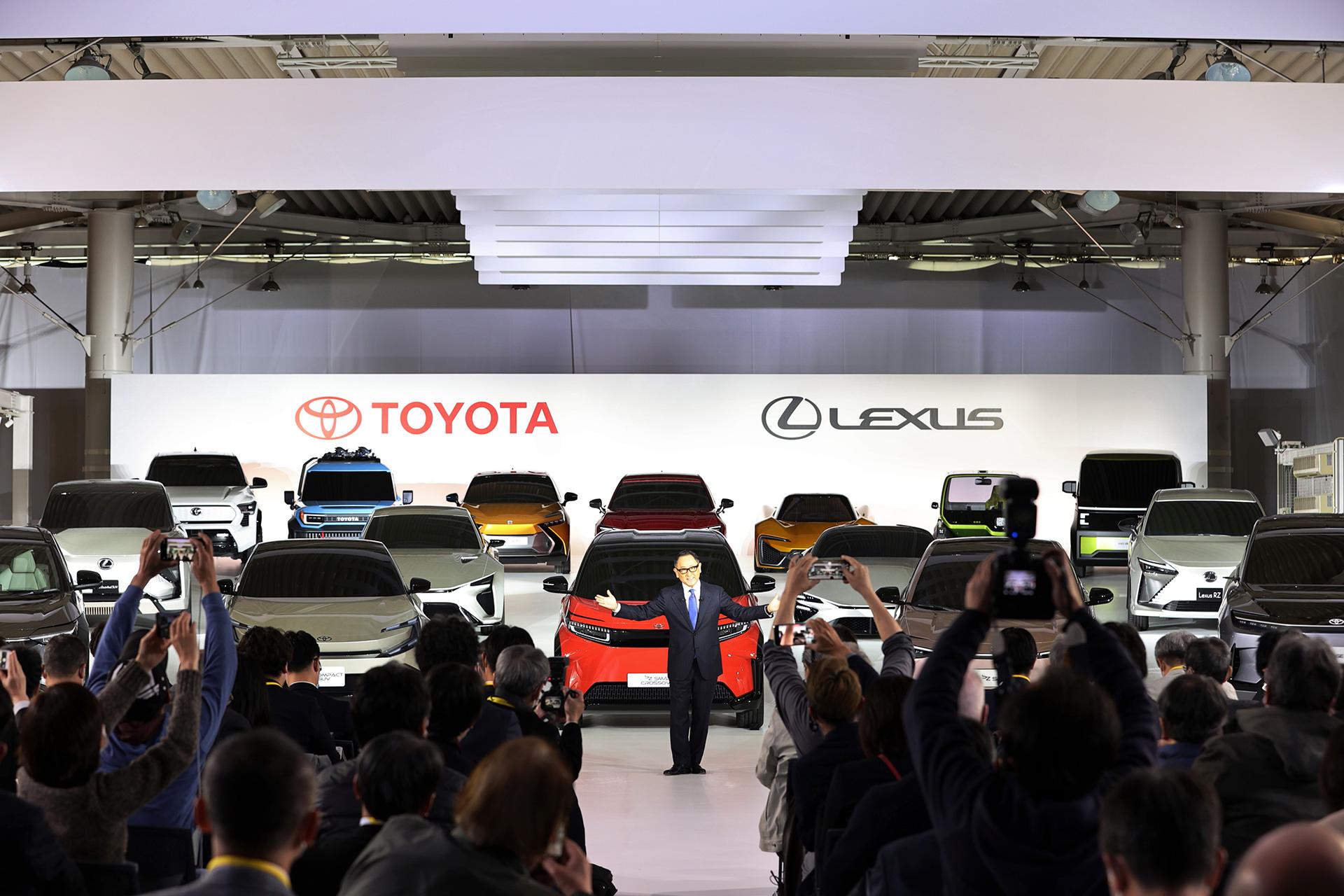
President Akio Toyoda gave an interview for U.S. media amid the BEV shift being a hot topic worldwide. Here are some highlights from their hour-long conversation.

During a trip to America in September, President Akio Toyoda spoke with members of the U.S. media about carbon neutrality. As chairman of the Japan Automobile Manufacturers Association (JAMA), he has been open about tackling the challenge of decarbonization.
Recently, Akio has also stepped up efforts to communicate his message overseas, emphasizing the need for diverse options fitted to individual countries while showcasing a hydrogen-powered engine car at the World Rally Championship (WRC) event in Belgium.

Ahead of the G7 summit hosted by Japan next May, it is becoming increasingly important to gain the media’s understanding of the need for diverse options which vary by country. With that in mind, Akio met with key U.S. media on this occasion.
The U.S. reporters posed direct questions about BEVs such as whether Toyota plans to accelerate its BEV investment plans and how to win over environmentalist groups and other stakeholders regarding the company’s electrification strategy.
Akio explained Toyota’s position from the basics, watching to see how the journalists reacted and understood. Below are his key responses in the interview.
Q1: Where does Toyota stand on carbon neutrality?
Allow me to explain Toyota’s approach to carbon neutrality in terms of our past, present, and future.
Over the past 20 years, Toyota has led the field. We have an advantage in hybrid electric vehicles (HEVs), of which we’ve already sold more than 5.2 million in North America.
These 5.2 million vehicles reduced CO2 emissions by 82 million tonnes. Since that figure may be hard to grasp, I checked how much this really means.
It is the equivalent of 10.5 million households. If that’s still not very clear, it is the same as eliminating a year’s worth of emissions from all households in Texas.
Toyota is a global company with a full lineup of products, including HEVs, plug-in hybrid electric vehicles (PHEVs), fuel cell electric vehicles (FCEVs), and BEVs. We see ourselves as still an industry leader now, in terms of offering all these options.
In December 2021, we announced our BEV strategy. In terms of volume, our goal by 2030 is sales of 3.5 million BEVs. Toyota sells 10 million cars a year, leading some to ask why our target is “only 35%.”

As I mentioned, Toyota’s strength lies in offering a full lineup of products globally. Looking around the world, we can see that over a billion people do not have access to adequate electricity supplies due to a lack of infrastructure.
Toyota sells cars in more than 200 countries and regions, with a vision of providing freedom of mobility for all. Our philosophy is that we want to leave no one behind.
I cannot predict the future. However, I believe that we can shape the future through the actions we take now.
Likewise with carbon neutrality, while continuing to build on the preparations we have made in the past, I believe that Toyota’s present, and future, are determined by the market and our customers.
As long as we don’t lose sight of that, I think we can remain a front-runner.
To add one more thing, we are a carmaker, and I am a car guy. I love cars. I also realize that there are growing expectations for carmakers to create the mobility of the future.
We hope you will look forward to the future that is being created by car enthusiasts like myself.
Q2: How will you win over environmentalist groups?
I honestly don’t know how far we would have to go in order to be seen as “proactive.”
Toyota operates on a different scale from other companies. I believe that the size of our investments is relatively large.
I realized from the outset that carbon neutrality cannot be achieved by car companies alone.
We understand that only the cooperation of all industries involved in the production, transportation, and use of energy can bring about positive results for the Earth.
Personally, I began by asking myself what carbon neutrality is really all about. I came to the conclusion that our enemy is carbon.
Our current technology has already begun lowering carbon emissions. In Japan, CO2 emissions have fallen by 23% over the past 20 years.
A shift to BEVs relies on lithium and other minerals. Toyota is a rarity among the world’s car manufacturers in that we produce our own batteries. We have experienced firsthand the difficulties involved.
One of our group companies, Toyota Tsusho, has been investing in mining for over a decade. To make electric cars, you need not only batteries but also many other components such as electrical steel sheets and eAxles.
At Toyota, we make and refine them ourselves, rather than simply buying the necessary parts from someone else. That has been our business model.
Although it takes time, we have been investing in electrification since we first started working on hybrids, with our sights on building BEVs.
The size of our current investments may appear small. However, if you look at Toyota’s activities over the past 20 years, the amounts are certainly not small, and they reveal the reality of our wide-ranging investment.

